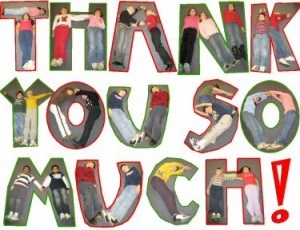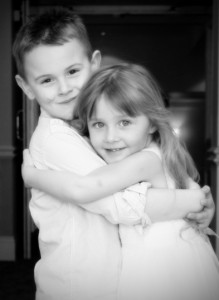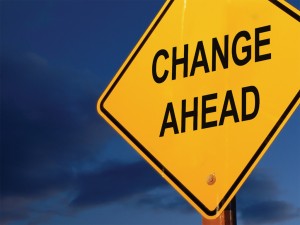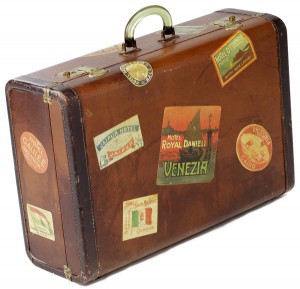 The title of this story was the classic response from Jesus, when after healing the ten lepers, only one came back to say, thank you. “Weren’t there ten of you?” He asked. Of course He knew how many there were; he had just healed them. He wanted the one person who returned with a grateful heart, and us, to know that He was questioning the whereabouts of the other nine. In effect, Jesus was asking, “Were the others happy to be healed of this terrible disease as well? Why didn’t they come back and say so?” Undoubtedly, the other nine men were very happy and excited to be healed; most likely, that was the problem. They were so excited that they forgot who to thank for their gift. They ran off to their homes and villages to show off the miracle, to stand before the crowds and reveal how fortunate their circumstances had changed. The gift became the focus of all, the center of attention; and the giver, the most important person in this moment, was cast in a supporting role. The nine were confused and mistaken. It was not the gift that was important, but the giver of the gift who was the real story. In their haste, (and happiness) they forgot about gratitude.
The title of this story was the classic response from Jesus, when after healing the ten lepers, only one came back to say, thank you. “Weren’t there ten of you?” He asked. Of course He knew how many there were; he had just healed them. He wanted the one person who returned with a grateful heart, and us, to know that He was questioning the whereabouts of the other nine. In effect, Jesus was asking, “Were the others happy to be healed of this terrible disease as well? Why didn’t they come back and say so?” Undoubtedly, the other nine men were very happy and excited to be healed; most likely, that was the problem. They were so excited that they forgot who to thank for their gift. They ran off to their homes and villages to show off the miracle, to stand before the crowds and reveal how fortunate their circumstances had changed. The gift became the focus of all, the center of attention; and the giver, the most important person in this moment, was cast in a supporting role. The nine were confused and mistaken. It was not the gift that was important, but the giver of the gift who was the real story. In their haste, (and happiness) they forgot about gratitude.
Monthly Archives: November 2011
You’re Welcome
 As Thanksgiving approaches there will be numerous articles written, radio programs broadcasted, and television shows aired bringing to our attention the need to be thankful. Setting aside one day a year to remember, and acknowledge all the reasons we have to be thankful is a very good tradition. I encourage everyone to embrace this holiday; to be with friends and family and carefully consider how lucky we are to be American’s, living where we do, having food in the pantry and people who love us. Only, my goal this season was not to write about Thanksgiving simply because everyone else is, yet here I am mentioning Thanksgiving three times in the first paragraph. So, I’ve decided instead to focus my writing on You’re Welcome; it’s what happens after thanks.
As Thanksgiving approaches there will be numerous articles written, radio programs broadcasted, and television shows aired bringing to our attention the need to be thankful. Setting aside one day a year to remember, and acknowledge all the reasons we have to be thankful is a very good tradition. I encourage everyone to embrace this holiday; to be with friends and family and carefully consider how lucky we are to be American’s, living where we do, having food in the pantry and people who love us. Only, my goal this season was not to write about Thanksgiving simply because everyone else is, yet here I am mentioning Thanksgiving three times in the first paragraph. So, I’ve decided instead to focus my writing on You’re Welcome; it’s what happens after thanks.
Saying “You’re welcome” is the finale of a three part process initiated by an action; not just any action though. For instance, stepping on someone’s foot while dancing doesn’t usually lead to you’re welcome, nor would denting a car door in the grocery store parking lot. To arrive at the desired good outcome, the first step is to do something that brings joy, happiness, relief, comfort or love to another person, whether you know that person or not. An action is needed to start the process. Being thankful unto itself normally is a passive experience, and living in the level of good fortune that we do, begs for more than a passive gratitude.
Heroes
Heroes
 “Dudley Do-Right, you are my hero!” was the all-encompassing praise of Nell, the ever so sweet girlfriend want-to-be of the good mannered, yet bumbling Canadian Mountie. Dudley’s goal in life, at least on the 1970’s cartoon, was to be Nell’s hero. Not a bad goal. We humans have, since the beginning of recorded history, searched for, and identified with a hero figure; someone that we want to emulate. Heroes are larger than life, they overcome great obstacles; heroes are fast, smart, typically good looking, wise, caring, brutal when dealing with a bad guy; yet humble, and kind to birds, kittens and bunny rabbits. Everyone wants to be a hero (at least secretly), and identifies with someone living, or from the past, that they call hero. Warriors have typically made good heroes for little boys, pitting good versus evil at terrible odds; but somehow good always triumphs. To be a hero it is important to win big and often. Explorers also commonly fall into the hero category, especially those who travel in either a wooden ship with many large sails, or a spacecraft with a single large engine; these explorers set out for places where “no one has gone before.” It is also important for a hero not to go to the same place over and over again, but to seek out exciting and dangerous new places. It is easier to be a hero if you are the creation in a book or movie, where life has a script to follow, and the writer can make certain that immoral choices are never made; where compromise is unknown and everyone (except for the bad guys) follows the rules. Life is much harder for the hero who lives, breathes, and makes decisions for themselves. We cannot just erase a bad drawing and start anew; real heroes, and their worshipers, must live with the consequences of a corrupt page.
“Dudley Do-Right, you are my hero!” was the all-encompassing praise of Nell, the ever so sweet girlfriend want-to-be of the good mannered, yet bumbling Canadian Mountie. Dudley’s goal in life, at least on the 1970’s cartoon, was to be Nell’s hero. Not a bad goal. We humans have, since the beginning of recorded history, searched for, and identified with a hero figure; someone that we want to emulate. Heroes are larger than life, they overcome great obstacles; heroes are fast, smart, typically good looking, wise, caring, brutal when dealing with a bad guy; yet humble, and kind to birds, kittens and bunny rabbits. Everyone wants to be a hero (at least secretly), and identifies with someone living, or from the past, that they call hero. Warriors have typically made good heroes for little boys, pitting good versus evil at terrible odds; but somehow good always triumphs. To be a hero it is important to win big and often. Explorers also commonly fall into the hero category, especially those who travel in either a wooden ship with many large sails, or a spacecraft with a single large engine; these explorers set out for places where “no one has gone before.” It is also important for a hero not to go to the same place over and over again, but to seek out exciting and dangerous new places. It is easier to be a hero if you are the creation in a book or movie, where life has a script to follow, and the writer can make certain that immoral choices are never made; where compromise is unknown and everyone (except for the bad guys) follows the rules. Life is much harder for the hero who lives, breathes, and makes decisions for themselves. We cannot just erase a bad drawing and start anew; real heroes, and their worshipers, must live with the consequences of a corrupt page.
We also like to expand the life of a hero into that of a role model. Not only will we praise the hero, and dream of them, but we will try to live just like our hero. “I want to be just like (fill in the blank) when I grow up.” John F Kennedy was a charismatic leader with true vision, and a great love for his country. Martin Luther King envisioned a better way to find the promise land, here at home. Neil Armstrong walked on the moon – we all saw it on TV. My list of heroes and role models included these people, and many more – sports figures, local celebrities, and of course, my Mother and Father. My parents were not always the hero in the moment, it was as I grew older, and had children of my own that their heroism became apparent.
Also, as I have aged, the reality that a hero / role model was imperfect has become abundantly clear. Heroes are people, and people are flawed; that was not a fact when I was ten, but it is now. Still, a person became my hero because of something specific that they were, or did: best batting average, first on the moon, amazing speech, or the finest example of character I have ever seen. Being human does not remove the heroic achievement, it gives it perspective. So, to cope with the reality of human heroes, we filter out the corrupt pages and only view the ones that fit the profile of our hero: kind, strong, wise, caring, decisive, moral, and fearless – a perfect role model as defined within our very human mind. The other pages: immoral, thief, liar, cheat, adulterer – they are torn out and cast aside, because they do not fit a hero’s mold. It is a very natural compromise, arising from the need to have a hero in our life, and the realization that a hero cannot be perfect in all things. I still keep heroes, who are human and very flawed; because I need them, and I think they need me. But, I realize, as I hope they do, that we are all a part of humanity, so perfection never enters into the conversation.
When I have a need for a flawless hero, I get on my knees and look up. I do this daily to remind myself, and Him, that perfection found its way to earth just once, and left an everlasting impression on all of us.
Thanks for reading.
Change
 There is an old saying that “change is inevitable.” I suppose that is right, and I know that every major scientist from Galileo to Einstein would agree, since we are on a rock that is circling the sun even when we are sitting perfectly still (impossible to do), we are in motion and thus there is constant change around us. Their point is well taken, each new day has a different period of daytime than the previous, the temperature changes every day and night; humidity, wind speed – the list of measurements can go on forever, and they will all support the old saying about change. So the outside environment changes constantly, not only where you are, but from place to place as well. For instance, six days ago I was standing on a warm beach, it was 85 degrees outside, and the humidity was 75%. Today at home, it is a not-so-balmy 45 degrees and raining. (That is a weather change that I could do without!) When you ride a motorcycle, the temperature can change dramatically every minute as you move from shade to sun. How about inside changes, are they inevitable as well? I know this; it must have been the external environmental factors, probably humidity, that caused all of my clothing to shrink while on vacation, because everything fit tighter going home than when we arrived. Some changes we consider good, and look forward to its arrival, and some we fight, not wanting that aspect of our life to change. Certain changes we wait to happen, and there are some important matters that will never change. For instance:
There is an old saying that “change is inevitable.” I suppose that is right, and I know that every major scientist from Galileo to Einstein would agree, since we are on a rock that is circling the sun even when we are sitting perfectly still (impossible to do), we are in motion and thus there is constant change around us. Their point is well taken, each new day has a different period of daytime than the previous, the temperature changes every day and night; humidity, wind speed – the list of measurements can go on forever, and they will all support the old saying about change. So the outside environment changes constantly, not only where you are, but from place to place as well. For instance, six days ago I was standing on a warm beach, it was 85 degrees outside, and the humidity was 75%. Today at home, it is a not-so-balmy 45 degrees and raining. (That is a weather change that I could do without!) When you ride a motorcycle, the temperature can change dramatically every minute as you move from shade to sun. How about inside changes, are they inevitable as well? I know this; it must have been the external environmental factors, probably humidity, that caused all of my clothing to shrink while on vacation, because everything fit tighter going home than when we arrived. Some changes we consider good, and look forward to its arrival, and some we fight, not wanting that aspect of our life to change. Certain changes we wait to happen, and there are some important matters that will never change. For instance:
Packing the Suitcase
 At the moment I am somewhere between Los Angeles and Mexico City, at 37,000 feet aboard Aero Mexico flight 18. Looking out my window in row 12, I see the Gulf of California; it’s a hazy morning, so distinguishing any details of the land is hard. The best I can perceive is that the water is blue and the land, brown. I should have been a detective with skills like that.
At the moment I am somewhere between Los Angeles and Mexico City, at 37,000 feet aboard Aero Mexico flight 18. Looking out my window in row 12, I see the Gulf of California; it’s a hazy morning, so distinguishing any details of the land is hard. The best I can perceive is that the water is blue and the land, brown. I should have been a detective with skills like that.
We will be traveling for nine days and could only take one bag, so it was important to pack the right items; a combination of things I need, and possessions that are important to me. We are going to a beach in a tropical area, so bathing suits, suntan lotion, cotton tee shirts, and square bottom shirts with wildly colored flowers splashed across a black background are necessities. Of course, your basic toiletries fit into that category as well, as does my passport. Some cash, not too much, and a credit card, a camera and sandals completes my must have list. It doesn’t seem like a big list but, I still found myself on the bedroom floor with one knee on the bag and perspiration dotting my forehead as I forced the zipper closed. The person at the check in counter listed the bag weight at 46 pounds, just shy of the maximum.
